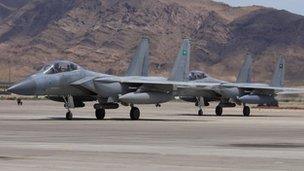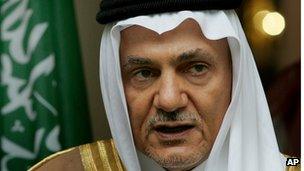Analysis: Selling arms to the Gulf
- Published

The US is making new technologies available to the Gulf forces
A huge new arms deal between the United States and Saudi Arabia may signal a push towards a unified military force in the Gulf.
In a deal that was announced in Washington on Christmas Eve, the Americans are shipping US $60 billion worth of fighter jets, helicopters and upgrades to the Saudis.
Just five days later the Pentagon announced another deal to sell missiles and related technology worth $3.5 billion to the United Arab Emirates.
The UAE package includes an anti-ballistic missile system called THAAD which is designed to destroy missiles both within and beyond the earth's atmosphere.
This marks the first time this highly sophisticated system has been sold outside America.
Washington has also approved plans to sell over 200 Patriot missiles to Kuwait.
And as the US and its Gulf allies continue to shore up defensive preparedness in the face of threats from Iran, pressure is growing on the smaller Gulf states to consider throwing in their military capabilities with the Saudis.

Prince Turki al-Faisal called for a unified Gulf defence force far exceeding the current one
Such a move would underline both a growing anxiety over Iranian intentions and the ineffectiveness of the Gulf Co-opertaion Council's own Peninsula Shield Force which was established in 1984.
The force was intended to protect member states from military aggression but it proved completely incapable of doing so when one of its states, Kuwait, was invaded by Saddam Hussein in 1990.
The only other military action of note was the intervention in March of last year to assist Bahraini authorities in quelling protests in the capital city Manama. The island kingdom is linked to Saudi Arabia by a causeway.
Most of the 1500 strong force deployed to Bahrain were Saudis. Troops protected key installations but were not involved in breaking up demonstrations.
New Push
The push for a new shared military capability was signalled in early December when the former Saudi Ambassador to the UK and the United States, Prince Turki al-Faisal called for "a unified military force, a clear chain of command" at a high level regional security conference in Riyadh, the Saudi capital.
The prince who for more than two decades ran the kingdom's General Intelligence Directorate is considered something of a maverick within the ruling family but his comments on foreign affairs are routinely seen as reflecting current thinking in the government.
Citing rising tensions in the region and the threat posed by Iran acquiring a nuclear bomb and other WMDs, he spoke of a "collective sovereignty".
"The security of one people is that of all, the stability of one is that for all, the misfortune of one is that on all."
He urged the partners to put aside what he called "petty differences".
"Ceding bits of individual sovereignty is an attractive proposition which reinforces our collective sovereignty," he told the conference in his keynote address.
No hurry
However other gulf nations, Qatar in particular, would not be in a hurry to embrace Turki al-Faisal's vision.
The Qataris under their energetic prime minister and foreign minister Sheikh Hamad bin Jassim Al Thani have pursued a vigorously independent foreign policy.
Under his tutelage, Qatar was quick to support the Libyan rebels against Qaddafi, pushed a reluctant Arab League into monitoring events in Syria and has just enabled the Taliban to open an office in the capital Doha.
All that has left the Saudis, the biggest player in the GCC, looking slow off the mark and has strained relations between the two.
Jeremy Binnie a Middle East analyst with Jane's Defence Weekly says an integrated force is doubtful.
"The Qataris, the Emirates and possibly others will be reluctant to take their marching orders from Riyadh," her explains. "The UAE has even struggled to integrate the armed forces of its constituent emirates."
And Michael Stephens a Royal United Services Institute Middle East expert based in Doha says that though the Americans would like to see the Saudis in command of such a force it is not likely to happen: "There is just too much distrust among the other gulf states of Saudi intentions."
Growing pressure
Still behind the scenes there are signs pressure from Washington is growing to bring together the military capabilities of the Gulf states.
In response to a question at a press briefing on the Saudi sale on 29 December state department Assistant Secretary Andrew Shapiro came close to endorsing a unified military force.
"We are interested in working with all the gulf nations in developing a regional security architecture that will enable them to meet the challenges and threats posed in the region," he said.
Although he refused to be drawn on whether the Saudi sale was aimed at containing Iran, Mr Shapiro spoke of "sending a strong message that the United States is committed to security in the Gulf and broader Middle East".
Jeremy Binnie of Jane's says that with tensions rising the most that the Americans can hope to achieve is to "co-ordinate local militaries in the event that hostilities with Iran look likely".
Given the current level of distrust between the other Gulf states and the Saudis, even that could prove a challenge.
And RUSI's Michael Stephens notes another worry for the Americans in their efforts to build a comprehensive defensive shield against Iran.
The GCC, after all, is not just buying from the United States. The UK is the next biggest supplier and France, Germany and China are all busy selling the Gulf states sophisticated military hardware.
"It's difficult," he says, "to get the technologies to talk to one another."
- Published29 December 2011
- Published28 December 2011
- Published14 September 2010